Topics:
Never Miss a Beat - Get Updates Direct to Your Inbox
FILTER:


How to Value an Internet Business in 2021
By Quiet Light


Your business is likely one of your most valuable assets, if that not the most valuable. However, many entrepreneurs are so focused on the daily grind that they’re not even aware of how much equity is in their business. Regardless of whether or not you’re considering selling, there are numerous benefits to uncovering its value.
A business valuation reveals much more than a number. It provides an intimate, detailed, and nuanced perspective into the aspects of your business that matter the most. Opportunities, weaknesses, and untapped potential all can come to light through the simple yet powerful process of a business valuation.
In this post, you will learn the key characteristics that determine a business’s value, as well as the specific levers that owners can pull in order to increase its appeal to potential buyers. Whether you’re set on continued growth or planning an exit strategy, a business valuation can provide invaluable insight and empower you to make sound decisions and frame your goals.
How a Valuation Works
For online businesses, the multiple method is by far the most common way to value a business.
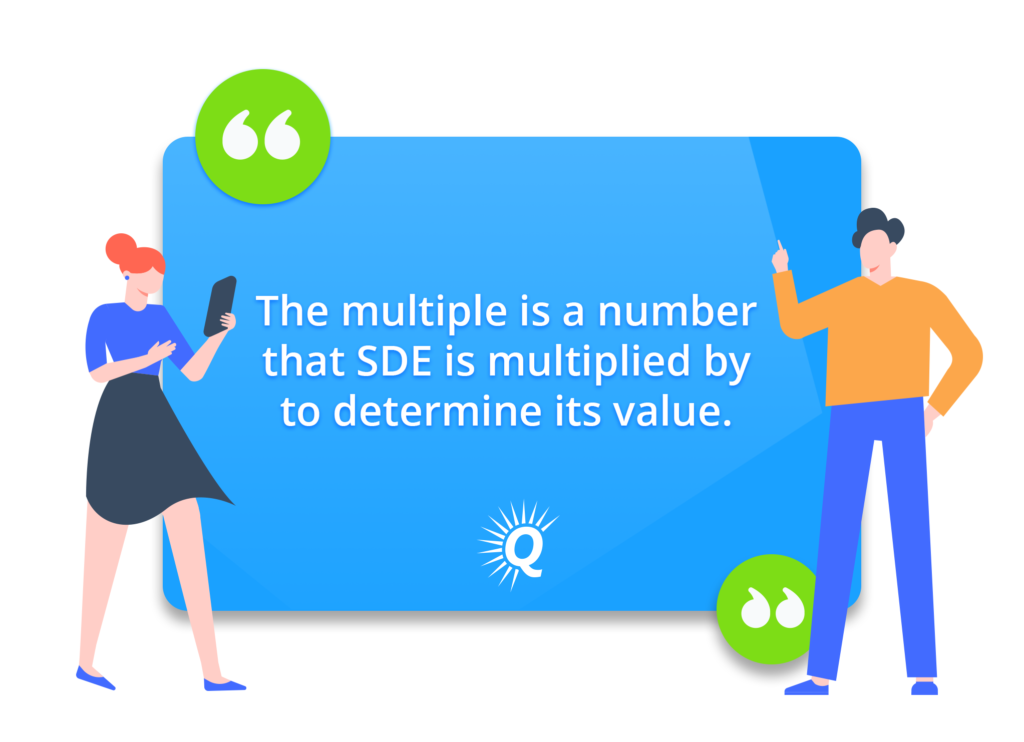

In most cases, there are two primary numbers that are used to calculate the value of the business:
- Seller’s Discretionary Earnings (SDE)
- The multiple
SDE is essentially a single owner’s total benefit. That is, the total annual profit including allowable addbacks for a single owner of the business (or two owners equaling no more than 40 hours of work). In other words, it is the amount that an owner can expect to profit from the business over the course of one year.


To calculate annual earnings, we look first at the business’s Profit and Loss (P&L) statements to determine its net income. Then, we add certain expenses that qualify as discretionary. Travel, a home office, and one-time purchases are a few examples of discretionary expenses that are added back to the business’s income to determine its SDE.
To be clear, this valuation formula is based on annual earnings, not monthly. Some brokerages and advisors refer to monthly earnings when stating the multiple. If you hear a broker talking about 36X multiples, don’t be tricked into thinking you’ll get 36X your annual earnings.
Additionally, inventory is not included in this valuation formula due to the fact that it’s constantly changing. After a valuation is determined, the value of current inventory is added on to arrive at the total purchase price.
Once you arrive at the SDE, it’s time to apply the multiple. The multiple is a number that SDE is multiplied by to determine its value. While SDE is rather straightforward to calculate, the multiple is based on numerous factors that determine the business’s value relative to its earnings.
The multiple accounts for all of the elements that affect the desirability of the business. For example if two businesses each have an SDE of $100,000 but one is worth $200,000 and the other is worth $400,000, it is due entirely to the difference in their respective multiples.
The first business has a multiple of 2X ($100,000 X 2 = $200,000). The second has a multiple of 4X ($100,000 X 4 = $400,000).
Ultimately, the multiple is a reflection of how reliably profitable a business is. In business valuation, profitability is the primary element that buyers look for. Although there are a multitude of factors that contribute to profitability, we have distilled them down to four:
- Growth
- Risks
- Transferability
- Documentation
We call these the Four Pillars of Value. Together, they determine the multiple of business, and thus, its value.
Growth
Most investors make their purchasing decisions based largely on how well they believe a given business will perform in the future. Of course, the business’s past and current growth rate is the most important metric in predicting its future.
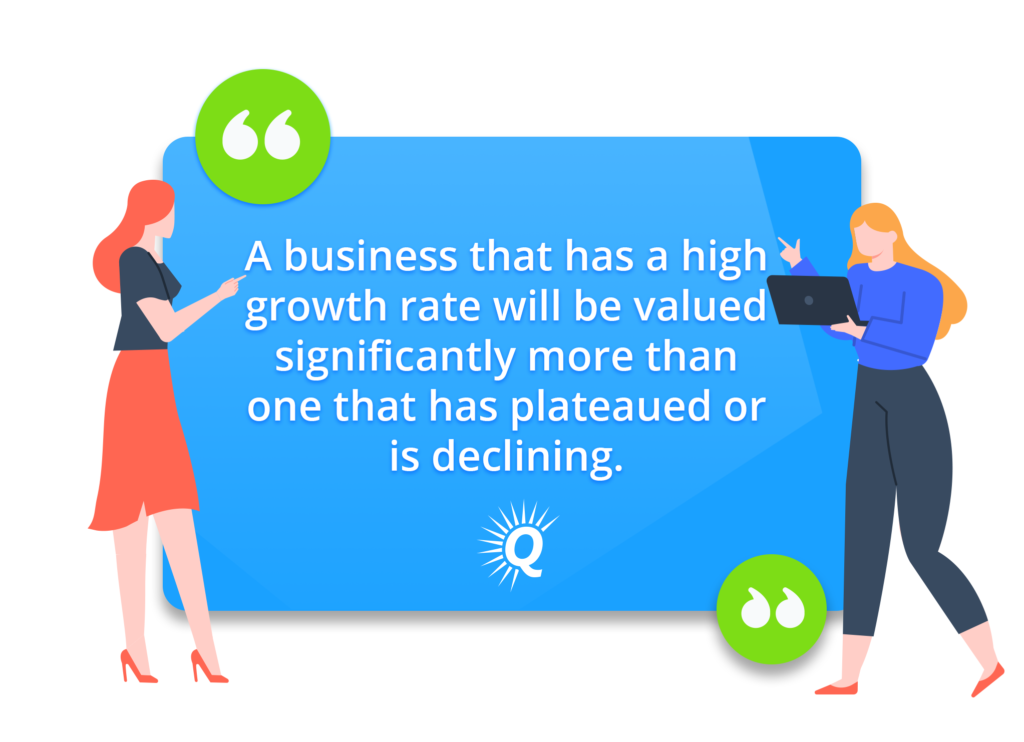

A business that has a high growth rate will be valued significantly more than one that has plateaued or is declining.
While growth is often in reference to profit and earnings, there are a number of other growth metrics that are also important. Customer acquisition channels, conversion rates, email lists, and content creation are all activities in which growth rates can be measured and evaluated.
Risk
Risks are the treats that a business faces. As common sense suggests, a business that is exposed to greater risks will be less valuable than one that is stable and has fewer. The less risk that is in your business’s future, the higher its value.
A few years ago at Quiet Light, we received multiple valuation requests from electronic cigarette companies. Whenever a rush of such requests comes from one particular industry, it’s usually a sign of trouble.
In this case, the Food and Drug Administration and the industry were battling over whether or not the FDA had jurisdiction over e-cigarettes—and whether the FDA would issue a ban if it did.
Thinking of Selling Your Business?
Get a free, individually-tailored valuation and business-readiness assessment. Sell when you're ready. Not a minute before.
Several owners of e-cigarette businesses didn’t want to take the risk that their companies would be valueless after an unfavorable FDA ruling. Buyers saw the obvious risk as well. The e-cigarette businesses that did sell for significantly less than they would have without the looming uncertainty.
Transferability
Transferability refers to the ease with which a new owner could fill your shoes and successfully run your business.
If the ownership of your business would be difficult to transfer, your value could suffer.
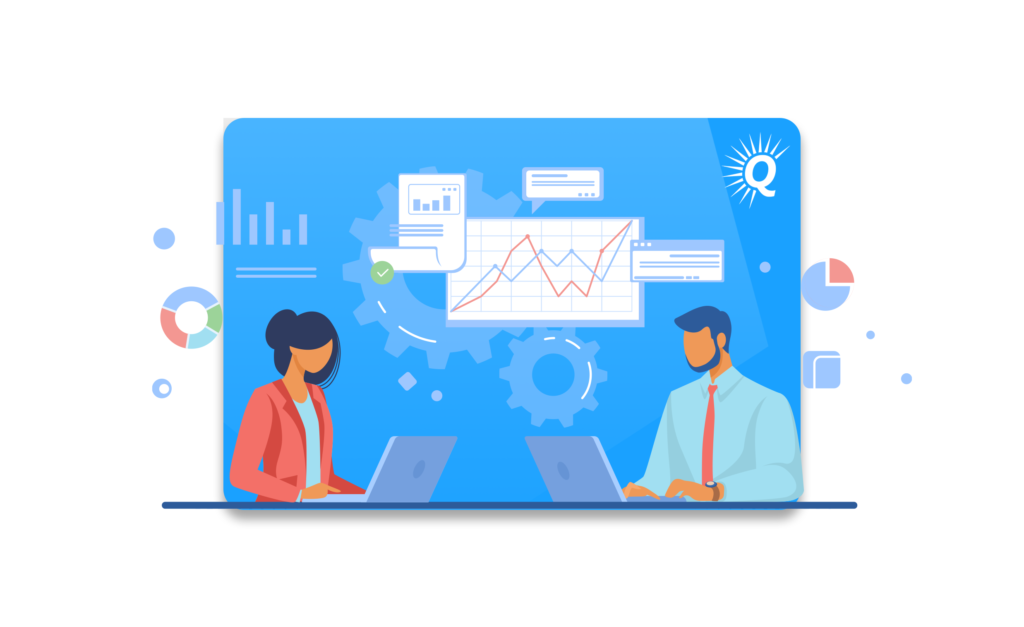

Transferability encompasses many different hurdles. Some industries have expensive and complex licensing criteria such as real estate and mortgage businesses. Others, like content sites or blogs, might rely heavily on the voice or personality of owners. In such a business, if an owner were to leave, the company’s brand recognition would take an immediate hit.
To determine the transferability of your business, consider whether a buyer could come in and understand how it runs within one month. The easier it is to answer “yes,” the more transferable your business likely is.
Documentation
Documentation is important both to determine a business’s value as well as to ensure its transferability.
Without proper financial documentation, it’s impossible to conduct an accurate valuation. Not surprisingly, most buyers will pass right over a business if the owners can’t provide well documented and accurate financial statements of its past and present performance.
Buy a Profitable Online Business
Outsmart the startup game and check out our listings. You can request a summary on any business without any further obligation.
Documentation also makes it significantly easier for a new owner to step in and take your place. If you have clear Standard Operating Procedures (SOPs) in place, buyers can feel confident that they’ll have a lucid roadmap for running your business.
SOPs also make it easier to replace employees or contractors if the need arises (and thus, reduces the risk that important tasks will be left undone).
While many entrepreneurs can evaluate their own businesses based on these Four Pillars of Value, most will find it very helpful to consult with an advisor who can help them avoid some of the challenges in business valuation.
Challenges with Valuing an Internet Business
If an internet business is well documented and the owners can provide all necessary information about its assets and performance, a skilled advisor should have no problem conducting a clear and accurate valuation.
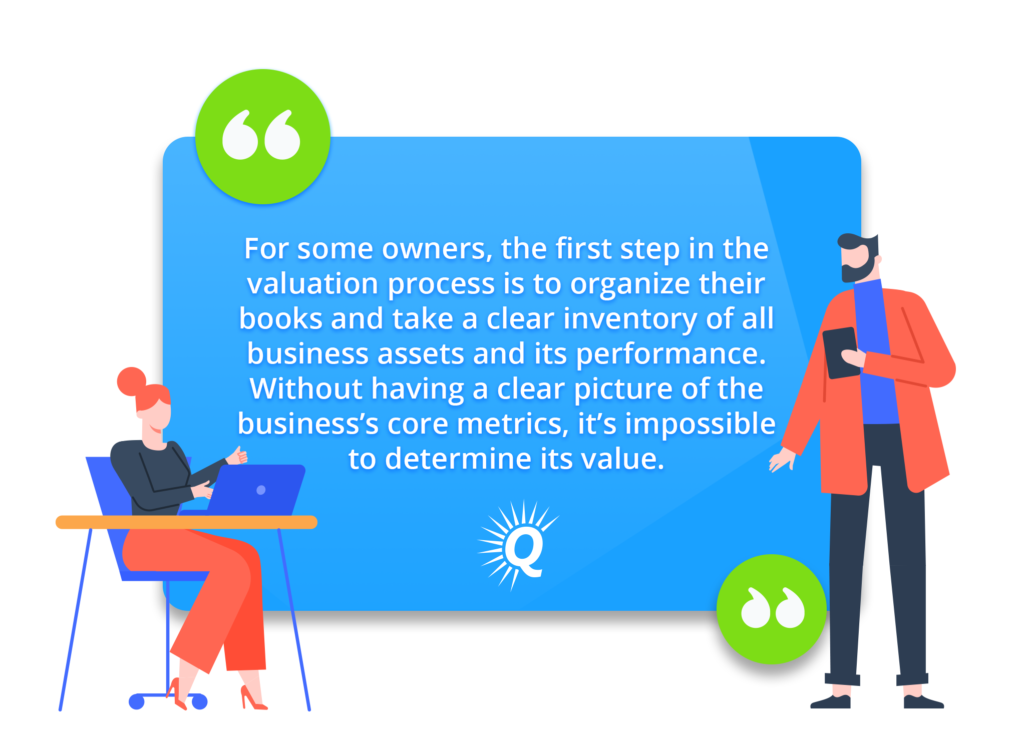

Challenges arise when the business owner is unorganized and cannot provide the necessary information for a valuation or ownership transfer.
For a small business with minimal complexity, it’s not uncommon for the owner to fulfill most of its tasks on their own and pay little attention to accounting or bookkeeping. In such a situation, it’s not unlikely that P&Ls and SOPs can’t be easily provided. After all, if the owner of an eCommerce business knows how to manage the supply chain and run the marketing activities, why would they choose to write instructions for those tasks?
For some owners, the first step in the valuation process is to organize their books and take a clear inventory of all business assets and its performance. Without having a clear picture of the business’s core metrics, it’s impossible to determine its value.
Many owners choose to hire an accountant who specializes in working with businesses within their niche or industry in order to generate the necessary financial records. Although tedious, the task of thoroughly and accurately going through revenue and expenses is essential.


Another challenge can arise when a company isn’t profitable. Although some businesses with negative earnings can still be valuable, their value can be more difficult and less straightforward to determine. Obviously, the multiple method isn’t appropriate for such businesses, so sellers and investors typically choose an alternative way such as discounted cash flow.
Sometimes, the first step in a business valuation is preparing for the valuation. If you’re unsure whether your business is ready for a valuation, speaking with a qualified advisor about your individual business is the best way to learn about what you should do to prepare for that process.
The Role of Profitability in Business Valuation
When making investment decisions, buyers pay close attention to how long it will take them to generate a Return On Investment (ROI).
If a business is priced at a million dollars but only generates $100,000 per year in annual earnings, it’s not difficult to realize that it will take ten years to pay off the investment (1M/100K = 10). This would mean the business is valued at a 10X multiple—one that almost no investor would accept for a typical online business.
On the other hand, if a business is priced at a million dollars but generates $400,000 in annual earnings, it would only take the investor 2.5 years to recoup their investment (1M/400K = 2.5). This would make the multiple only 2.5X.
Investors are willing to pay a higher price for more profitable businesses because they know that the business’s income will pay off their investment in a shorter period of time than one that generates less income. This leads to a higher value for businesses that are highly profitable.
We can discuss numbers at length but the basic logic is extremely simple: investors buy business primarily so they can enjoy the profit that it will provide to them in the future. The greater the profit, the higher the price that they’re willing to pay.
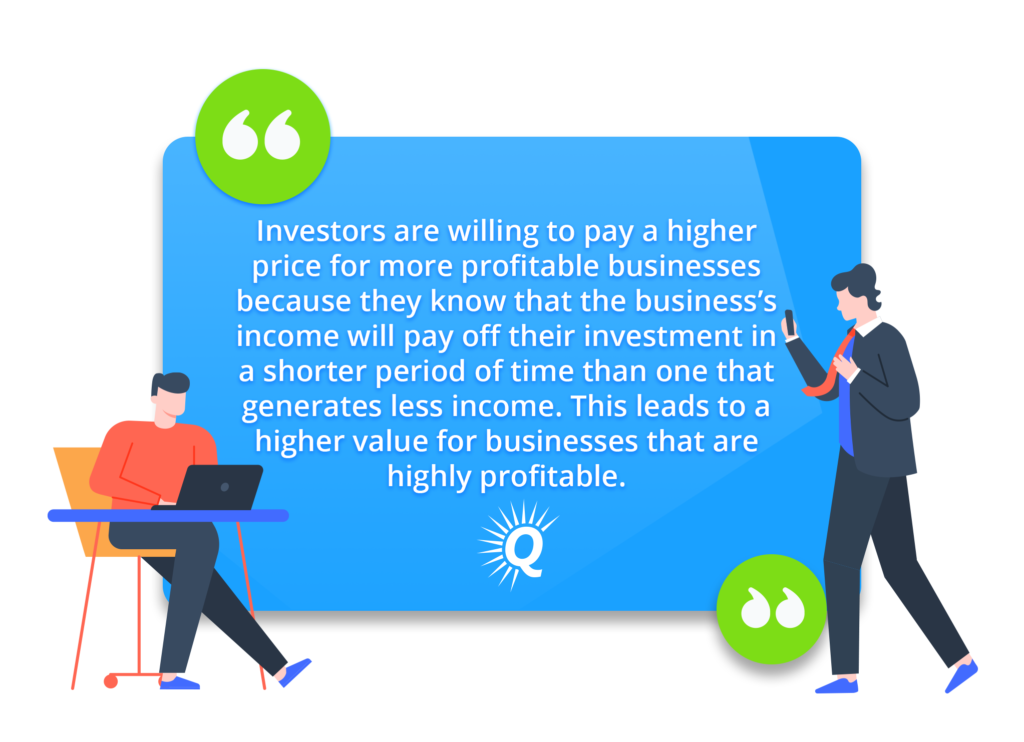

Of course, there are a variety of other elements that are important in determining the business’s ability to continue generating the same or greater profit in the future—customer satisfaction, growth opportunities, and market volatility, to name a few.
Evaluating and Reducing Risk for Internet Businesses
Smart entrepreneurs and investors both know that it’s best to look for possible weaknesses before they become actual threats. The fewer weaknesses that can be found in your business, the less risky it will be in the eyes of potential buyers.
Value and risk are inversely correlated, for obvious reasons.
Thinking of Selling Your Business?
Get a free, individually-tailored valuation and business-readiness assessment. Sell when you're ready. Not a minute before.
There are numerous risk factors that various online businesses need to be aware of. Some of these include:
- Competition
- Unstable market demand
- Economic
- Supply chain instability
- Legal
- Security
Competition
Competition can be a significant risk to your business, depending on its position in the marketplace. Savvy investors typically do their homework to learn about the threats that other companies might pose to your business.
Unstable Market Demand
Some products are more stable than others. Everyday staple products that have a proven track record of consistent sales are generally considered to be less risky than those that might be part of a short-term fad. A lot of entrepreneurs love to jump on emerging trends and take advantage of niches with minimal competition, but those are often risky because market demand can sometimes disappear quickly.
Economic Risk
Some businesses are more vulnerable to economic trends than others. Depending on how your business fares in varying economies, investors may view it as more or less risky in comparison to other internet based companies.
Supply Chain Instability
eCommerce businesses that rely heavily on a single supply chain are vulnerable to disruptions that could cut off their primary source of revenue. On the hand, businesses that have backups for their various suppliers have dramatically less supply chain risk exposure. If one supplier goes down, another is there to satisfy your production demands.


Legal Risk
No new owner likes to be surprised with lawsuits! Using intellectual property (IP) without the proper permissions can create significant risks and potentially imperil the future of the business unless the right measures are taken. Typically, that means ensuring that all IP registrations and licenses are in place and up to date.
Security
Cybersecurity is something that any growing online business needs to be aware of in order to avoid unnecessary security risks. Although this is more applicable in certain industries that have many different critical systems, having an effective risk assessment and risk management process is essential whenever business is taking place at scale online.
Since every business is different, each owner should evaluate the unique risks that their company faces. A business advisor can help to provide personalized feedback about a specific business.
How to Grow an Internet Business
All entrepreneurs are in the pursuit of growth.
If you’re preparing to sell, growing your business will help to increase its value and ensure a more profitable exit. If you recently purchased a business, growth will allow you to generate a higher ROI, enjoy additional income, and reduce the length of time required to pay off your investment.
Since there are many different kinds of internet businesses, there are a multitude of activities that can contribute to growth. While it’s important to evaluate each business based on its individual needs, a few common growth strategies include:
- Launch additional product lines.
- Expand to new marketing channels.
- Increase advertising budgets.
- Improve conversion rates.
- Raise prices.
- Create affiliate partnerships.
Launch Additional Product Lines
Launching additional product lines is a simple yet powerful way to grow most eCommerce businesses. As common sense suggests, if you can provide more products to your existing customers, you should have an easy time generating more revenue and growing your business.
Expand to New Marketing Channels
Many businesses choose to leverage their existing audience and customer base by offering products that complement their existing line. Often, a loyal customer will choose to purchase many different products from a company they like.
Thinking of Selling Your Business?
Get a free, individually-tailored valuation and business-readiness assessment. Sell when you're ready. Not a minute before.
Increase Advertising Budgets
Expanding to new marketing channels is another strategy that applies to most online businesses. Within eCommerce, many companies start on one platform but then expand to another once their revenue has reached a certain threshold.
Improve Conversion Rates
Amazon businesses often build a Shopify store that leverages their existing supply chain infrastructure and marketing assets. While this can be a great growth strategy, it’s always important to recognize that some businesses don’t perform as well in certain channels as others. For example, just because a business is successful on Amazon doesn’t mean it will succeed on Shopify, and visa versa.
Raise Prices
Expanding to new marketing channels applies to SaaS businesses as well. Those that create multiple customer acquisition sources don’t only grow their revenue; they also reduce their risks since they’re less dependent on a single source of traffic and customers.
Create Affiliate Partnerships
Increasing advertising budgets on successful campaigns is a great way to scale proven growth strategies. If your business is experiencing massive success with Facebook, YouTube, or Instagram ads, why not double your budget and profits? Of course, smart owners will pay close attention to how ad budget changes affect revenue and growth.


In addition to increasing traffic, it’s also wise to reevaluate how effectively your business is converting that traffic into paid customers.
Even if your landing pages convert, it doesn’t mean they can’t be improved. Unless you’ve thoroughly tested and refined all of your pages in a systematic and detailed way, you might be leaving money on the table by settling with your current landing pages.
Businesses that can increase their conversion rate by only one percent can experience a substantial increase in revenue.
One area that is often overlooked is pricing adjustments. Many businesses set arbitrary prices for their products or services without thoroughly testing to learn what price point generates the highest revenue.
For example, a SaaS business that tests various prices might learn that they can double their subscription fees while only reducing their conversion rate by 10%. If that’s the case, they’re in a position to substantially increase their revenue on new customers without much investment or effort.
Affiliate partnerships can be another great growth opportunity for businesses in all industries and niches. By leveraging the audiences and marketing capacities of strategic partners, many companies are able to quickly and significantly grow their bottom line.
Transferring Ownership of an Internet Business
Transferring ownership of most digital assets is pretty straightforward and simple during a business acquisition. In some cases, there can be other barriers in the transfer process (more on this below).
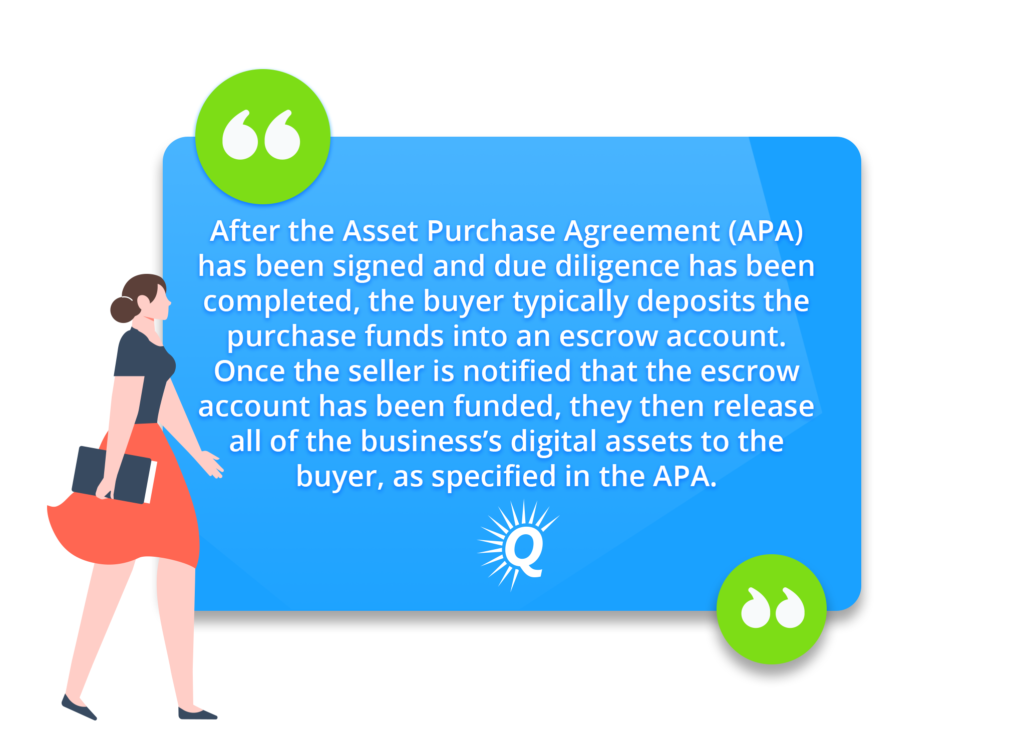

After the Asset Purchase Agreement (APA) has been signed and due diligence has been completed, the buyer typically deposits the purchase funds into an escrow account. Once the seller is notified that the escrow account has been funded, they then release all of the business’s digital assets to the buyer, as specified in the APA.
Transferring ownership of a digital asset is often as simple as providing the user name and password of its respective account, such as for a static IP address. In some cases, the seller must create a separate user account for the buyer, who then becomes the account admin and removes the seller from the account.
In the case of domain names, it’s common to transfer a domain name from one hosting account to another (i.e. the seller’s GoDaddy account to the buyer’s Godaddy account). Although most digital assets follow a pretty similar transfer process, it’s important to do your research and follow the correct protocol for each platform on which the business owns accounts.
While transferring the technical aspects of a business are generally easy, there are a number of other factors that can create challenges for business ownership transfers. These can include:
- Specialized knowledge requirements.
- Licensing requirements.
- A lack of distinction between the business and the seller’s personal identity.
- A lack of systems and documentation.
If a business requires that the owner have rare, specialized knowledge, then that can significantly reduce the pool of potential buyers and limit its transferability. Similarly, if the business requires that the owner hold special licensing requirements, that can also provide an additional barrier.
For example, if your business offers dermatology products that can only be legally sold by a licensed dermatologist, you’ll need to sell to the fraction of potential buyers that are legally qualified to run your business.
Another common barrier occurs when the seller’s personal identity is connected to the business. A dentist who uses their name to sell toothbrushes or a physical therapist who uses theirs to sell physical therapy equipment will encounter challenges when trying to sell. Unless they can remove their name and prove that the business is still viable, they’ll be hard-pressed to find an interested buyer.
Lastly, no one likes to take on a business that is disorganized and impossible to understand. If you’ve been filling all the roles in your business and don’t have any systems or structure, it’s going to be very difficult to transition staff and help another owner step in and take your place.
Luckily, disorganization has a remedy, but it typically takes some time and work. Most sellers who find themselves in this situation choose to hold off on selling until they’ve had a chance to document and systemize their business before listing it for sale. This allows them to receive a higher valuation when they’re finally ready.
How to Increase the Value of Your Internet Business
To increase the value of your business you can focus on increasing its growth, reducing its risks, making it more transferable, or improving its documentation.
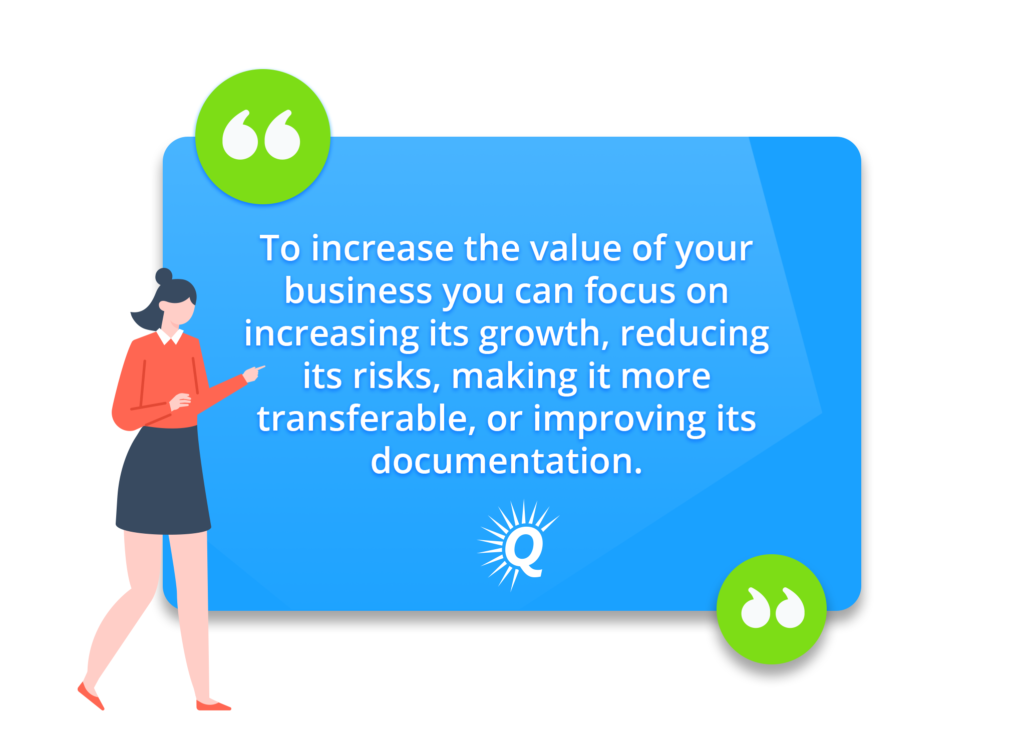

Here are four proven strategies that can help you to achieve these goals and appeal to more potential buyers:
Identify single points of failure
Single points of failure are elements that could significantly harm your business if they failed. By identifying and addressing these, you can eliminate significant risks from your business.
Over-reliance on natural search engine traffic is one common example. To combat this, it’s important to include other traffic sources like email lists, pay-per-click campaigns, branding initiatives, and affiliate partnerships. Buyers love good search engine rankings but are wary of businesses that have no other sources of traffic.
Other examples include relying too heavily on a single vendor or only a few customers. Diversifying suppliers insulates your business from potential consequences in the event that a single vendor is unable to satisfy your production requirements.
Similarly, if your business revenue depends heavily on one customer (15 percent or more in revenue) or only a few customers (25 percent or more), it’s important to focus on growing your revenue base.
Systemize your business
If you’re the cog of every wheel in your business, you have a problem. It’s normal in the early days of startups for the owner to be heavily involved, but as your company grows, it’s critical to delegate work to employees and create internal systems to keep things running smoothly in your absence. By doing so, your business can easily transfer to a new owner.
Keep great financial records
Your bookkeeping doesn’t have to be absolutely perfect, but there is a strong correlation between the completeness of a business’s financial records and its value at sale.


Not only do sound financial records reduce risk, but they also have the potential to increase your business’s growth prospects. Buyers look for threats and opportunities, and without good financial records, you leave them wondering how much of each your business really has.
Make your business unique
Don’t let your business look like every other company in your market sector. If it does, it will have significantly more competition and will be difficult to distinguish in the marketplace. Being unrecognizable can significantly detract a business’s value.
Creating a unique brand and value proposition can significantly reduce your risk and increase growth. Whether your uniqueness is expressed through a custom shopping experience, brand awareness campaign, or customer service, distinguishing your business makes it less replicable and more appealing when selling your website.
Ultimately, nothing increases the value of a business like investing in it. Focusing on your bottom line, working to create future prospects, and branching out in new directions can do wonders for the value of your internet business.
ROI is always the driver of value, so focus on building the kind of company that will promise buyers solid, safe returns on their investments.
While the information presented here provides clarity on the core elements that determine a business’s value, it’s important to understand how those elements apply to your specific business. If you’re interested in learning more about the valuation process or discovering how much your business is worth, feel free to reach out to schedule a free consultation with one of our qualified business advisors.





